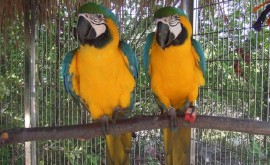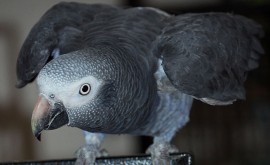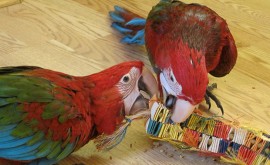 Aspergillosis is a fungal disease caused by the organism, Aspergillus. It may develop in any bird, but companion birds most frequently diagnosed with aspergillosis include African Grey, Amazon, and Pionus parrots.
Aspergillosis is a fungal disease caused by the organism, Aspergillus. It may develop in any bird, but companion birds most frequently diagnosed with aspergillosis include African Grey, Amazon, and Pionus parrots.
How do birds become infected? Aspergillus may be found everywhere but this fungal organism grows best in a warm, moist environment. When the area starts to dry out, the fungus will switch from the active, growing form (hyphae) to the infectious spore form. Spores are microscopic particles that can be inhaled or ingested. Once spores enter the body, Aspergillus can switch back to the hyphae form and grow within the body eventually causing illness.
Aspergillosis is most likely to occur in a bird with a weakened immune system or a bird exposed to an overwhelming number of spores. Factors that may promote the growth of Aspergillus include:
- the presence of waste like old, moist food or bedding or soil contaminated with droppings
- organic cage substrates like corn cob bedding
- poor sanitation and ventilation
- stressors such as illness, malnutrition, or exposure to excess cold or heat
- steroid use, even for a short period of time
- prolonged antibiotic administration
Aspergillosis is not contagious, and is not passed directly from bird to another. It is possible, however, for a bird with aspergillosis to be a potential source of fungal spores in the environment.
What are the signs? Although aspergillosis may involve any body system, fungal spores most commonly invade the trachea, air sacs, and/or lungs. Signs of aspergillosis will depend on the number of spores that enter the body and the organ system affected.
Clinical signs of lower respiratory tract disease may be dramatic and develop rapidly or signs may develop slowly and subtly. Signs of advanced respiratory disease may include reluctance to move or fly, poor appetite, a loss or change in voice, signs of increased respiratory effort such as open-mouth breathing or persistent tail bobbing, or even sudden death. From the airways, Aspergillus can enter blood vessels and travel anywhere in the body such as the liver, kidney, brain, or spinal cord. In rare instances, Aspergillus can invade feather follicles or skin.
How serious is Aspergillosis? Unfortunately, aspergillosis is an extremely serious condition that often carries a poor prognosis. Aspergillosis is usually not diagnosed until disease is quite advanced and many internal changes can occur before outward signs of disease are seen.
What is the treatment? Treatment of fungal infection relies on the use of antifungal medication. However even the most potent drugs have a hard time penetrating fungal “granulomas” or walled off collections of fungi and debris. Therefore depending on your bird’s status, your veterinarian may also want to remove granulomas surgically or endoscopically.
Can disease recur? Although antifungal drugs may kill all actively growing fungal hyphae, medication will not affect granulomas. If the bird’s immune system should weaken again, it is possible for granulomas to release active fungal hyphae to spread through the body again.
What can be done to prevent aspergillosis?
1. Keep the bird’s cage and environment clean. Remove feces and discarded food frequently. Control dust and consider use of a high-quality HEPA filter air purifier.
2. Provide appropriate husbandry. Select a cage with a grate and cover the cage bottom with an inorganic, non-dusty cage substrate like newspaper. Avoid organic substrates such as corncob bedding. Ensure adequate airflow and prevent bird exposure to respiratory irritants like cigarette smoke.
3. Minimize stress, promote overall health and support immunity. Minimize crowding, and provide a wholesome, balanced diet. Prevent exposure to extreme heat or extreme cold.
Contact your veterinarian for additional information on aspergillosis.
References
Kearns KS. Avian aspergillosis. Recent Advances in Avian Infectious Diseases, 2003. Http:// www.ivis.org/advances/Kearns/kearns2/IVIS.pdf. Accessed June 12, 2008.
Blumberg J. Aspergillus: The fungus among us. Pet Bird Report #39. Pp. 74-76




